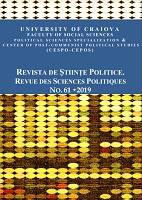The Challenges and Formative Moment of Romanian Semi-Presidentialism
The Challenges and Formative Moment of Romanian Semi-Presidentialism
Author(s): Loretta C. SălăjanSubject(s): Constitutional Law, Political history, Government/Political systems, Post-War period (1950 - 1989), Transformation Period (1990 - 2010)
Published by: Editura Universitaria Craiova
Keywords: semi-presidentialism; Romania; post-communism; constitutional design;
Summary/Abstract: A brief survey of the literature on comparative constitutional engineering shows that semi-presidentialism has sparked a variety of views regarding its conceptualization. Although a widespread choice in post-communist Europe, the semi-presidential model contains inherent vulnerabilities that have proved to be even more challenging in the Romanian case. This article employs the notion of “formative moment” to reevaluate the origins of the problematic nature of Romania’s semi-presidentialism, which is well illustrated in the domains of foreign policy and national defence. Despite being inspired by the French fifth republic, the Romanian system features a chain of interwoven foreign affairs decision-making, where the president largely depends on the other state pillars, particularly the government. The formative moment lens is useful in understanding why the post-communist constitutional drafters decided to tightly constrain the powers of the Romanian presidency. It thus unveils the factors that have decisively influenced Romania’s emerging democratic system: the widespread post-communist political turbulence and the prevalent meanings circulating in the constitutional debates.
Journal: Revista de Științe Politice. Revue des Sciences Politiques
- Issue Year: 2019
- Issue No: 61
- Page Range: 34-45
- Page Count: 12
- Language: English

